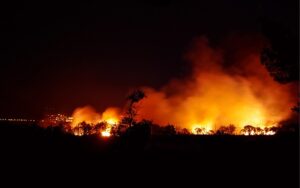Psalm 83
The Psalms
Psalm 83
Dealing with God’s enemies
Psalm 83
1 A song. A psalm of Asaph.
O God, do not keep silent; be not quiet, O God, be not still. 2 See how your enemies are astir, how your foes rear their heads. 3 With cunning they conspire against your people; they plot against those you cherish. 4 “Come,” they say, “let us destroy them as a nation, that the name of Israel be remembered no more.”
5 With one mind they plot together; they form an alliance against you—6 the tents of Edom and the Ishmaelites, of Moab and the Hagrites, 7 Gebal, Ammon and Amalek, Philistia, with the people of Tyre. 8 Even Assyria has joined them to lend strength to the descendants of Lot. Selah
9 Do to them as you did to Midian, as you did to Sisera and Jabin at the river Kishon, 10 who perished at Endor and became like refuse on the ground. 11 Make their nobles like Oreb and Zeeb, all their princes like Zebah and Zalmunna, 12 who said, “Let us take possession of the pasture-lands of God.”
13 Make them like tumble-weed, O my God, like chaff before the wind. 14 As fire consumes the forest or a flame sets the mountains ablaze, 15 so pursue them with your tempest and terrify them with your storm.
16 Cover their faces with shame so that men will seek your name, O LORD. 17 May they ever be ashamed and dismayed; may they perish in disgrace.
18 Let them know that you, whose name is the LORD—that you alone are the Most High over all the earth.
______________________________
Psalm 83 – Dealing with God’s enemies
(Verses 1-4) The annihilation threat to Israel is not new. The Jewish people have suffered many threats and attacks throughout their history, and even recently there has been debate about anti-semitism in UK politics. God’s ancient physical people are hated and persecuted and so are His spiritual people, Christians. The devil seems to have a masterplan, to oppose God’s people though he can never master Almighty God. Here Asaph points out that there are enemy conspiracies and plots to destroy Israel, and even the remembrance of Israel. He asks God to get involved. Often individual Christians are opposed, and this is a good way to handle it: pray to God.
(Verses 5-8) As here, where specified, named, historical foes of Israel join to conspire against them, opposition can come from many sources. It is wise to see and evaluate the threat and vital to pray and keep on trusting and following God.
(Verses 9-12) Asaph comforts himself by thinking back to how God had given His people escape and victory over a variety of powerful enemies in their past. For example, the book of Judges shows that Gideon’s much reduced army beat Midian and their chiefs, and that Deborah and Barak defeated Jobin and Sisera—all unlikely victories without God’s help.
 (Verses 13-15) Asaph asks for the defeat of Israel’s and God’s enemies in ways replicating things seen in nature. ‘Tumbleweed’ is translated ‘whirling dust’ in another translation: each of those suggests something becoming useless. Asaph asks that to be the fate of their foes. ‘Chaff before the wind’ has the same kind of meaning, that instead of being strong enemies to reckon with they should become insignificant. He asks God to remove them, as a forest fire removes the trees, and to terrify them by His ‘tempest’.
(Verses 13-15) Asaph asks for the defeat of Israel’s and God’s enemies in ways replicating things seen in nature. ‘Tumbleweed’ is translated ‘whirling dust’ in another translation: each of those suggests something becoming useless. Asaph asks that to be the fate of their foes. ‘Chaff before the wind’ has the same kind of meaning, that instead of being strong enemies to reckon with they should become insignificant. He asks God to remove them, as a forest fire removes the trees, and to terrify them by His ‘tempest’.
(Verses 16-18) Asaph wants the shame of their foes to cause onlookers to seek the LORD. That is our desire too: that enemies of the Lord and His gospel will be so conquered by the love of God, in sending Jesus to die for them and bear their sins and the penalty for those sins, that they seek God, and ask Jesus to save them. That is victory! As part of that process Asaph prays for their shame, dismay, and disgrace to drive them to realise that God is the only ‘Most High over all the earth’. If you trust Jesus, you will rejoice in God’s greatness, and in His mercy and love.